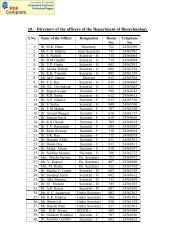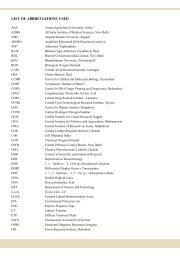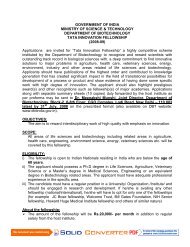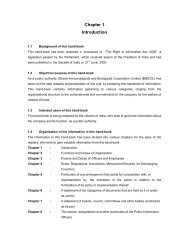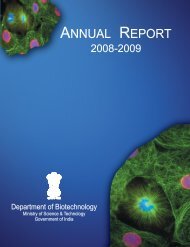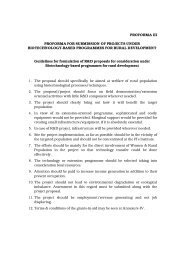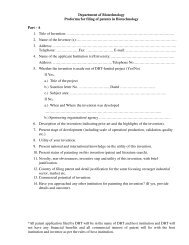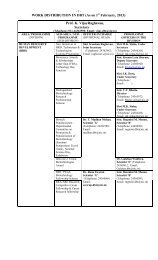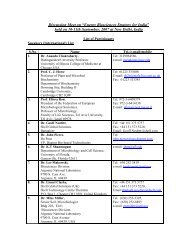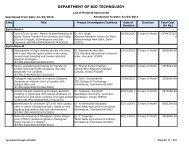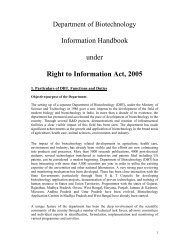ANNUAL REPORT - Department of Biotechnology
ANNUAL REPORT - Department of Biotechnology
ANNUAL REPORT - Department of Biotechnology
Create successful ePaper yourself
Turn your PDF publications into a flip-book with our unique Google optimized e-Paper software.
USP method. These included 59 smear negative and<br />
18 smear positive samples (17 <strong>of</strong> 1+ and 1 <strong>of</strong> 3+<br />
grade). So far five sputa yielded culture in liquid<br />
medium that was confirmed as M. tuberculosis. PCR<br />
positivity was estimated to be 71.4%, 83.1%, 76.6%<br />
for gel-based, visual and fluorimetric detection<br />
formats, respectively. At present the group is<br />
analyzing with molecular beacons obtained from US<br />
collaborator.<br />
Further a total <strong>of</strong> 120 samples have been collected<br />
from pulmonary as well as extra-pulmonary patient<br />
samples. The samples have been processed by the<br />
USP method. The extracted DNA is being used in the<br />
N-PCR hupB assay for the detection <strong>of</strong> M.<br />
tuberculosis and M. bovis. The hupB molecular<br />
beacons are being designed. Analysis <strong>of</strong> the human<br />
samples is near completion to standardize the<br />
beacon assay with PHRI collaboration.<br />
Leishmania:<br />
Studies were conducted at the Institute <strong>of</strong> Pathology,<br />
New Delhi and CBER, FDA, USA on discovery <strong>of</strong><br />
virulence-related genes in Leishmania donovani<br />
using genomic microarray. The study has identified<br />
the full length ORF <strong>of</strong> 3 clones and found them to be<br />
Calpain, NAD/FAD dependent dehydrogenase and<br />
a trypanosomatid specific hypothetical protein.<br />
Transcripts for each <strong>of</strong> these genes have been<br />
demonstrated in bone marrow <strong>of</strong> kala-azar patients,<br />
implicating their role in disease pathogenesis.<br />
Cloning, expression and functional characterization<br />
<strong>of</strong> these three genes in underway.<br />
Respiratory Syncytial Virus (RSV) and<br />
Metapneumovirus (hMPV)<br />
The first community-based study <strong>of</strong> viral ALRI in<br />
India in the past three decades has been conducted<br />
at AIIMS, New Delhi and UAB School <strong>of</strong> Medicine,<br />
Albama, USA.. These data will be useful for planning<br />
the study <strong>of</strong> future respiratory virus vaccines or other<br />
interventions to reduce the disease due to viral ARIs.<br />
Molecular characterization <strong>of</strong> RSV strains from New<br />
Delhi revealed variation in proportion <strong>of</strong> infections by<br />
different RSV genotypes. This is the first study <strong>of</strong><br />
RSV molecular epidemiology from India and the first<br />
description <strong>of</strong> the circulation pattern <strong>of</strong> RSV<br />
genotypes in both rural and urban Indian settings.<br />
The present sero-epidemiological study gives<br />
information on RSV infection in the rural community<br />
in India. Further longitudinal sero-epidemiological<br />
studies with both group A and group B specific<br />
antigens <strong>of</strong> RSV are required to define the role <strong>of</strong><br />
antibodies in immunity and pathogenesis <strong>of</strong> RSV<br />
infection. This information is crucial for development<br />
<strong>of</strong> RSV vaccine strategies.<br />
Group A Streptococcus (GAS)<br />
Epidemiological surveillance studies were<br />
conducted at PGIMER, Chandigarh; CMC, Vellore<br />
and NIAID, NIH, USA. At PGIMER, Chandigarh, out<br />
<strong>of</strong> a total <strong>of</strong> 178 group A positive samples <strong>of</strong><br />
pharyngitis and impetigo, emm typing <strong>of</strong> 111 has<br />
been done. emm typing <strong>of</strong> rest will be completed<br />
soon. Anti Streptolysin O and Anti Dnase B titration<br />
shall also continue.<br />
Joint Workshops<br />
In order to have trained personnel to carry out clinical<br />
trials and conduct clinical research, DBT, ICMR,<br />
DCGI and USDHHS have organized a series <strong>of</strong><br />
workshops on clinical trials and clinical research over<br />
the next 2-3 years with a goal to provide state-<strong>of</strong>-theart<br />
training on clinical research with particular<br />
emphasis on clinical trials and the complex<br />
requirements necessary for the testing and licensure<br />
<strong>of</strong> drugs, vaccines, diagnostics, and devices for<br />
therapeutic and preventive use. The first workshop <strong>of</strong><br />
the series was organized from April 4-6, 2006 at<br />
G.S.Medical College & KEM Hospital, Mumbai in<br />
which about 140 scientists/clinicians participated.<br />
The workshop focussed on issues like selecting<br />
relevant research question, protocol development,<br />
biostatistics, managing a study, good clinical<br />
practice (GCP), good laboratory practice (GLP),<br />
Indian regulations agencies etc. Lectures, group and<br />
panel discussions on specific topics were also<br />
presented by faculty which comprises <strong>of</strong> national and<br />
international experts.<br />
The second workshop on Bioethics in Clinical<br />
Research was organized from June 20-22, 2006 in<br />
New Delhi in which more than 100 member<br />
secretaries <strong>of</strong> institutional ethical committees and<br />
others participated. The workshop focused on a<br />
specific aspect <strong>of</strong> clinical research, the need for<br />
171 International Collaboration



